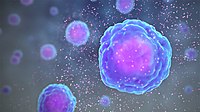
Photo from wikipedia
Mast cells (MCs) are critical for initiating inflammatory responses to pathogens including viruses. Type I interferons (IFNs) that exert their antiviral functions by interacting with the type I IFN receptor… Click to show full abstract
Mast cells (MCs) are critical for initiating inflammatory responses to pathogens including viruses. Type I interferons (IFNs) that exert their antiviral functions by interacting with the type I IFN receptor (IFNAR) play a central role in host cellular responses to viruses. Given that virus-induced excessive toxic inflammatory responses are associated with aberrant IFNAR signaling and considering MCs are an early source of inflammatory cytokines during viral infections, we sought to determine whether IFNAR signaling plays a role in antiviral cytokine responses of MCs. IFNAR-intact, IFNAR-blocked, and IFNAR-knockout (IFNAR−/−) bone-marrow-derived MCs (BMMCs) were treated in vitro with a recombinant vesicular stomatitis virus (rVSVΔm51) to assess cytokine production by these cells. All groups of MCs produced the cytokines interleukin-6 and tumor necrosis factor-α in response to rVSVΔm51. However, production of the cytokines was lowest in IFNAR-intact cells as compared with IFNAR−/− or IFNAR-blocked cells at 20 h post-stimulation. Surprisingly, rVSVΔm51 was capable of infecting BMMCs, but functional IFNAR signaling was able to protect these cells from virus-induced death. This study showed that BMMCs produced pro-inflammatory cytokines in response to rVSVΔm51 and that IFNAR signaling was required to down-modulate these responses and protect the cells from dying from viral infection.
Journal Title: International Journal of Molecular Sciences
Year Published: 2020
Link to full text (if available)
Share on Social Media: Sign Up to like & get
recommendations!